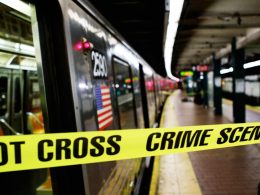New York City will make plans to build more than 1,000 new public bathrooms over the next decade under a bill passed by the City Council Thursday that seeks to address a serious shortage of toilets open to all.
Under the bill, sponsored by Councilmember Sandy Nurse, the city would be required to develop a blueprint for building more bathrooms, with a specific benchmark of getting 2,120 public toilets available in the next ten years, although there’s no mandate for the city to make good on that number.
There are currently about 1,000 public toilets citywide, Nurse said.
The legislation passed in an unanimous vote.
Nurse’s bill will require the city to produce a report every four years for how they plan on building and maintaining more facilities and how much it’ll cost.
Public
Verena Dobnik/AP Photo People line up to use a free public restroom in New York, Thursday, April 27, 2017. (AP Photo/Verena Dobnik)
The city is in dire need of more restrooms. The Big Apple has just four public toilets per 100,000 people, according to QS Supplies’ 2021 Public Toilet Index — less than the national average of eight per 100,000 residents.
“Every single person walking around New York City should be free to pee in a private, clean, functioning bathroom,” Nurse said at a press conference before the vote. “No one should have to experience the humiliation or stress of having to relieve themselves out on the street.”
Under the bill, at least half of the bathrooms would be publicly owned, with the other 50% possible through public-private partnerships.
Nurse said the lack of access to restrooms, in addition to crackdowns on public urination laws, endanger some of the city’s most vulnerable, like homeless people, seniors, parents of small children and those with medical conditions.
The NYPD issued 3,698 criminal and 5,672 civil tickets for public urination in 2023.
In June 2024, Mayor Adams announced he would build or renovate dozens of city restrooms and released a digital map showing public restroom locations.
A report last fall from the City Council found that two-thirds of 100 public restrooms inspected were closed or in dirty or unsafe conditions.








